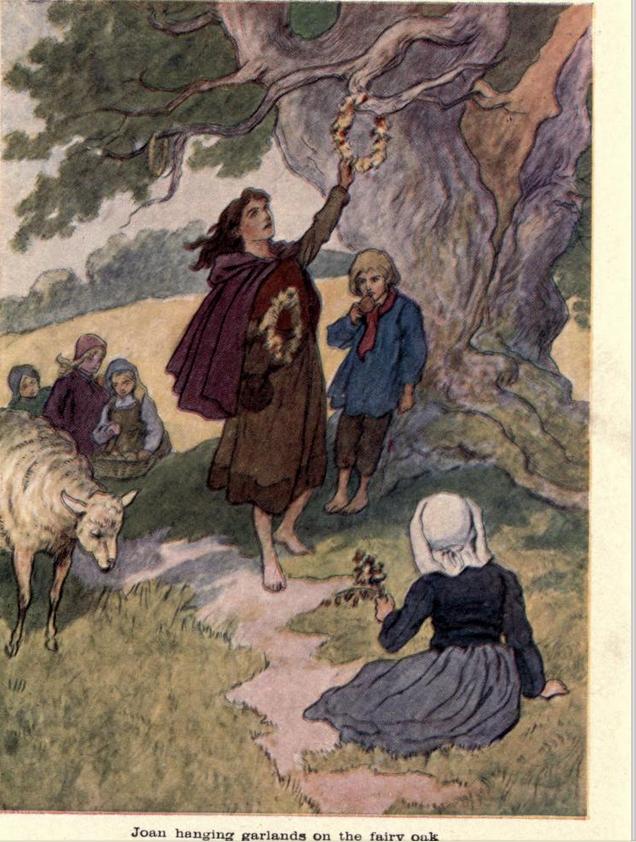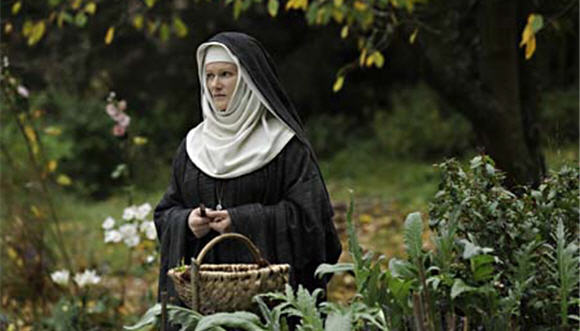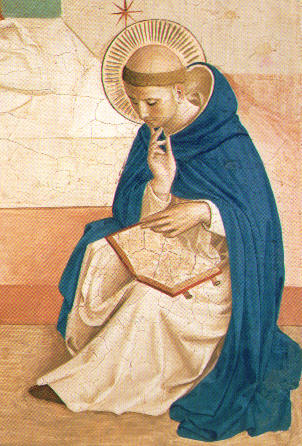Usually when you think about the saints and their encounters with faerie, St. Patrick or St. Columba, or many of the saints from Ireland, Scotland or even Wales or England come to mind. There are many "canon" stories as well as folk legends and other stories that describe a wide variety of interaction- from condemnation (in some of the more well known stories about St. Columba, for example) to acceptance and integration (in the case of the baptism of Eithne, a maiden of the Tuatha De Dannan, by St. Patrick).
What doesn't come to mind as often is St. Joan of Arc, the Maid of Orleans and (through God) the savior of France, and some of the evidence brought forth for her trial at the hands of the English.

The Catholic Church (which seems like it can be amazing in some cases and awful in others...coming from a Catholic) had a long list of accusations against Joan (because if Catholics are anything, it's thorough, at least), and some of the items in that list had to do with the faery folk, and her relationship to them in her adolescence.
"
1) Joan claimed that fairies were not evil.
2) Joan had some of her visions of St Margaret and St Catherine near a fairy tree and a fairy fountain, the implication being that they were fairies i.e. demons.
3) Jean danced around said tree and left garlands of flowers there as sacrifices to the fairies.
4) Her godmother was a fairy seer who had traffic with the fairies and who had taught Joan some of her witchcraft." (StrangeHistory)
In support of this are other resources I had found (and I'm sure there are more out there), testimony regarding these accusations:
"On the subject of the Fairies' tree, I have heard that the Fairies came there long ago to dance; but, since the Gospel of Saint John has been read under the tree, they come no more. At the present day, on the Sunday when in the Holy Church of God the Introit to the Mass 'Laetare Jerusalem' is sung, called with us 'the Sunday of the Wells,' the young maidens and youths of Domremy are accustomed to go there, and also in the spring and summer and on festival days; they dance there and have a feast. On their return, they go dancing and playing to the Well of the Thorn, where they drink and amuse themselves, gathering flowers. Jeanne the Maid went there, like all the other girls at those times, and did as they did; but I never heard say that she went there alone, either to the tree or to the well which is nearer the village than the tree-or that she went for any other purpose than to walk about and play like her companions. When Jeanne left her father's house, she went two or three times to Vaucouleurs to speak to the Bailly. I heard it said that the Lord Charles, then Duke of Lorraine, wished to see her, and gave her a black horse." (Testimony of JEAN MOREL, of Greux, laborer, from stjoan-center.com)
So, anyone reading this can see that once there was a sort of cultus that the tree and the well were the focus of, common in the Faery Faith, that was overlaid by the wide-spread Christianization of France. Trees and wells are usually the homes of such creatures and a locus for interaction, even serving as points of entry into Faery (wither that's in the flesh or by soul-flight, I'll leave it up to you).
They say that since the Gospel of John was read there, the Faeries weren't seen there again...but I'm not so sure. This is the same spot where Jean the Maid often saw her own visions, though perhaps not all of them...St. Margaret appeared to her here, and, well, read it for yourself:
"
Philibert, lord bishop of Coutances As far as I have been able to gather from these articles, this woman affirms that St. Michael and St. Gabriel with a host of angels, and St. Catherine and St. Margaret, appeared to her, sometimes near a fairy tree: that she bodily touched these saints who comforted her, and promised them, to keep her virginity. Then she was questioned about a certain tree growing near her village. To which she answered that, fairly near Domrémy, there was a certain tree called the Ladies’ Tree, and others called it the Fairies’ Tree; and near by is a fountain. And she has heard that people sick of the fever drink of this fountain and seek its water to restore their health; that, she has seen herself; but she does not know whether they are cured or not. She said she has heard that the sick, when they can rise, go to the tree and walk about it. It is a big tree, a beech, from which they get the fair May, in French le beau may; and it belongs, it is said, to Pierre de Bourlemont, knight. She said sometimes she would go playing with the other young girls, making garlands for Our Lady of Domrémy there; and often she had heard the old folk say (not those of her family) that the fairies frequented it. And she heard a certain Jeanne, the wife of mayor Aubery of Domrémy, her godmother, say that she had seen the fairies; but she herself doesn’t know whether it is true or not.. Asked if she saw them elsewhere, she does not know at all. She had seen the young girls putting garlands on the branches of the tree, and she herself sometimes hung them there with the other girls; sometimes they took them away, and sometimes they left them there." (StrangeHistory)
So, the tree was rededicated and miraculous events kept happening there, and it did not completely lose it's reputation for faery activity.
Hmmmmmmm...
I have no doubt that the beings that St. Joan saw there were saints and angels, but I think the faeries would not have stood being in close proximity to the conquering religion, unless some of them were agreeable to it. Rather than for the Queen of the Faeries, they make garlands for Our Lady...aren't there other Roman Catholic Marian sites that have a reputation for faery activity? (We'll come back to this.)

So what does Joan herself have to say about all this?
1. She said she did not know if faeries were evil or not.
Okay, keep in mind that Joan is expected to tell these people what they want to hear in hopes to live, and while she has a mind to her own danger, she usually does not. Joan saying "I don't know" usually means one of two things: She either really doesn't know or she definitely knows what she things, and she's not going to admit to it. Admitting that you had any positive opinion of the faeries at all was tantamount to saying "Hey, yeah, demons are my buddies": this isn't the reality of (most of) fairies, but most Catholics past and present don't know that.
Joan seems to take the road of denial, here. It's strange to me- she does not cave with the majority of belief, saying that fairies are certainly evil, but she doesn't sing their praises, either. She simply says, "I don't know." She doesn't help her case by this, either.
One thinks perhaps Joan may just be telling the truth. Faeries are as variated, or moreso, as we are. There are pagan fae and Christian fae and nature spirits, fae that are the Children of Eve and fae that are not, and fae who are, honestly, demons. There are angels that probably work closely with fae, as well. Are faeries good or evil? Maybe the real answer is, "It depends." But, you know, "I don't know" is also pretty honest.
"True, there was a common European idea that fairies were, like many of us, caught between heaven and hell, an idea that continued into the nineteenth century. But would you really admit this to a panel of clergymen?! Joan had courage (so much courage), but she lacked theological smarts. It is telling that when she was accused of not denying the evil natures of fairies she did not seem to understand the accusation." (StrangeHistory)
Let's look at her other answers...from StrangeHistory, my primary source because I am lazy and if you wanna look into this more, you will on your own.
(2)
There was a fairy tree (a beech, not an oak as in the picture from Andrew Lang’s children’s book above) and a fairy well (where the sick drank) in the environs of Domrémy. The locals claimed, according to Joan’s brother, that Joan had had her visions there. Re the appearance of St Catherine and St Margaret at the tree, she replied ‘I don’t know’. Given Joan’s understandable evasions, ‘I don’t know’ normally means one of two things in the trial records. ‘I can’t remember’, or ‘Yes, but I’m not foolish enough to admit it to you.’ Beach would guess the second in this instance. Joan did, in any case, admit that she saw saints (plural) at the fountain. She must have been aware that she was being set up and that the saints she saw were being cast as fairies and, therefore, demons. Incredibly she did not protect herself more forcefully saying only that ‘As far as she knew… she never saw the fairies at the tree.’
I've read that Beech trees are sacred to Odin...I mean, Druids...I mean, fairies! Fairies! Sacred to fairies! The rest of this point pretty much reads for itself.
3) Is the easiest to deal with. Jean admitted to sometimes dancing there as a child, and even to making garlands, but not to consorting with the fairies. She said that she made the garlands for the Madonna.
4) Her godmother Jeanne was the wife of the mayor. Joan said that this woman was ‘held and reputed to be an honest woman, and not a witch or sorceress’: yes, her godmother claimed to have seen fairies, ‘but [Joan] herself doesn’t know whether it is true or not’. Joan knew she was likely to die and was not going to criticize a loved one?
Joan later said that those who went out to dance on Thursdays around the fairy tree were guilty of Witchcraft...I wonder if she was drawing a line between honoring and worshipping, in her mind? Because despite this, Joan doesn't seem to want to overly criticize the fairies themselves. Or the people who went with her in good faith:
HAUVIETTE, wife of Gerard of Syonne, near Neufchâteau.
She was a good girl, simple and gentle; she went willingly and often to Church, and Holy places. Often she was bashful when others reproached her with going too devotedly to Church. There was a tree in the neighborhood that, from ancient days, had been called the Ladies' Tree. It was said formerly that ladies, called Fairies, came under this tree; but I never heard any one say they had been seen there. The young people of the village were accustomed to go to this tree, taking food with them, and to the Well of the Thorn (This is also called the "Fontaine aux Groseilliers"; the Latin name is probably intended for Rhamnus, the Buckthorn.) [Ad fontem Rannorum, or, "ad Rannos"] on the Sunday of 'Laetare Jerusalem.' (Mid-Lent Sunday, the 4th Sunday in Lent; so-called, because the introit for the day begins, "Laetare Jerusalem," ) called the Sunday of the Wells. I often went there with Jeanne, who was my friend, and with other young girls on the said Sunday of the Wells. We ate there, ran about, and played. Also, we took nuts to this tree and well. I did not know of Jeanne's departure: I wept much ; I loved her dearly for her goodness and because she was my friend. Jeanne was always with her father and mother at Neufchâteau. I also was at Neufchâteau, and saw her there all the time. (from stjoan-center.com)
Seems like the remnants of faery culture were still pretty wide-spread.
I find it interesting that, under oath and in the dubious hands of the Inquisition, Joan refused to wholly denounce the faery people (though she did their worship), when two well known saints, Patrick and Columba, were on the record for saying that they were no better than demons. (Though, that too depends on who you talk to...Columba has many, many stories about his dealings with the faery, and Patrick baptized Eithne, a maiden of the Tuatha De Dannan, much to the grief of Aengus Mac Og.) Makes one think, really.

There is one more point I want to make. Do you remember when I said something along the lines of the Cult of Our Lady replacing the Cult of the Faery Queene/ Faeries? Well, it's happened at a few other places, too.
There is a loooooong history of people confusing the Queene of Faery with the Blessed Mother...check out the link below if you want to peruse that. So, I'm not saying that this confusion is ALWAYS correct (since in the case of Thomas Rhymer and Tam Lin, it obviously was not), but I think that sometimes, it is. I think any faery who was a child of Eve, or was a Christian, would adore the Blessed Mother and take her as their queen, just as we have. And I don't think she would ignore them, or leave them alone, because Queen and Mother (Mother first) is what God created her to be.
Anyhoo.
I just thought I would mention...there is a reputation for White Ladies (a kind of faery) being honored at Lourdes. The Blessed Mother appeared as a Lady in White with a blue sash. While I do believe Our Lady of Lourdes is, in fact, Our Lady, I find it interesting that she chose to appear there clothed in such a similar manner.
It makes me wonder about Fatima.

http://www.strangehistory.net/2014/10/13/joan-ark-see-fairies/
http://www.stjoan-center.com/Trials/null03.html
http://www.strangehistory.net/2012/06/28/the-virgin-and-the-fairies/
http://www.aroundtheworldineightyyears.com/lourdes-france/
















